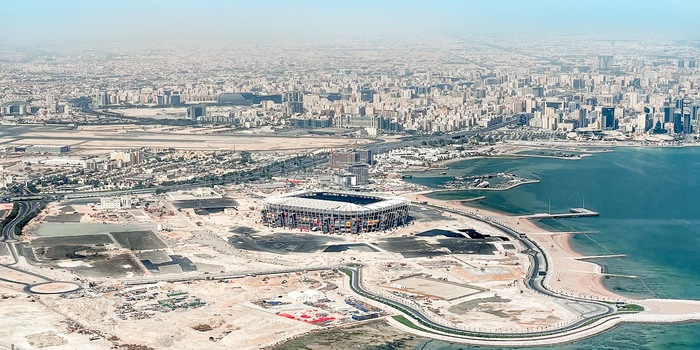
Opinion
Why The Diplomat’s the smartest political series of our time
by Luca Fontana

The world is congregating in the desert to play footie for almost a month. The question is, should we watch? Are we even allowed to? If the most clamouring voices are anything to go by, then we’re not. Ab – so – lute – ly not. But I see things a bit differently.
It’s absurd that the biggest sporting event in the world – both socially and economically – is being held in a tiny desert country with a sporting tradition that consists solely of horse riding and falconry. There’s no denying that this World Cup wasn’t just allocated incorrectly; it’s also well documented that it was bought. The whole world knows the human rights situation there is disastrous, unless you’re a member of the royal family or an influencer on their payroll. Even Sepp Blatter, in his role as FIFA president, commented on the World Cup allocation today by saying it was clearly a mistake. That’s not much use now and doesn’t help anyone, but it’s significant nonetheless.
It remains to be seen how much FIFA will learn from this allocation (and previous difficulties). But we’re entitled to have our doubts. In any case, the next World Cup takes place in 2026 in Canada, the US and Mexico. At least they’re countries with a sporting tradition, even if it’s not specifically football.
There are a myriad of reasons why this World Cup shouldn’t be held in Qatar and very few reasons (erm, which ones exactly?) why it should. Public debate has flared up around whether football fans in Switzerland should punish the tournament by ignoring it. This discussion is absolutely logical and, for the most part, understandable. But in this moment, right before the start of the tournament, it won’t change anything.
The bottom line is: the World Cup is going to take place. As was planned twelve years ago. The stadiums have been built, sponsorship money has flown in, and TV rights have been sold. Allegedly, thousands of construction workers have paid with their lives and tens of thousands worked in slave-like conditions. These are catastrophes. And they cast a dark shadow not just over Qatar and FIFA, but also the whole world.
Why? Because the uproar, opposition and tournament boycott should have started in 2010. If confederations, national associations and superstars of world football formed a united front to protest against letting Qatar host the World Cup, FIFA might have come to its senses. But as a footballer supposedly said in an interview: «Hindsight is 20/20.»
And now here we are, bickering amongst each other about it not being OK to watch a match on TV. Or about whether it’s alright to turn on the box for one or two games without having too much of a guilty conscience. But of course, without telling anyone.
Yes, at the moment it’s very popular and normal to say with utter conviction that you’re definitely not going to watch it because corruption. Because it’s too big. Because human rights. Because discrimination. And because everything. But let’s be honest for a sec. When the starting whistle blows for the final at 4 p.m. CET on 18 December, most of us will be sat in front of the telly, cheering on one team or another. 1.12 billion people tuned in to the 2018 World Cup final. I’m pretty sure that figure won’t change dramatically this December.
And what’s more, I don’t think anyone should feel bad for doing so. Surely we shouldn’t stop children watching the World Cup when they have such a fresh, innocent love for the game, just like Martin Jungfer did in the 80s and ’90s. What about Canadian players? They first qualified in 1986 and have only qualified twice in total. Should the players have a guilty conscience and be punished by their fans at home by not watching? Will we change anything about the World Cup allocation or extravagance in sports by not following the tournament? The answer is no. Foisting the responsibility onto fans at home who’re watching in front of the screen is neither fair, sensible nor effective. If you want to watch the World Cup, you should be able to.
Nevertheless, you can still hold the opinion that, even in this case, or subsequently, it’s better to protest than not at all. That’s why it’s just as acceptable to decide you don’t want to have anything to do with this World Cup. Not tuning in to any games at all is just as much the right thing to do as watching a few games or catching as many as you possibly can, even Wales vs. Iran. At the end of the day, everyone has to decide for themselves. The only thing I find hypocritical is when someone uses their decision to make themselves morally superior and then feels compelled to shout it from the rooftops.
*PS: The kind of boycott that I think could change things is one that affects the biggest sponsors – i.e. those who’ve invested the most money. They’re scared of bad publicity. And a bad deal might be enough to stop them signing up to anything FIFA suggests without giving it the slightest thought in future.
Globetrotter, hiker, wok world champion (not in the ice channel), word acrobat and photo enthusiast.
This is a subjective opinion of the editorial team. It doesn't necessarily reflect the position of the company.
Show all